|
Dorothy sat with the Wizard in a huge cavern. They were reacquainted with one another the same way their paths were parted. The Wizard floated away and back again, in a hot air balloon. Now they were trapped underground. They could see the sun in the distance, but they had no way to reach it. Once again, the Wizard had survived by tricking the different people into believing he could do real magic. No one in this party believed he was a real Wizard. The curtain had been pulled back, and the trick had been learned. Dorothy knew what he really was. The Wizard was a humbug. The Wizard spoke those words in an injured tone. Dorothy spoke those words in love. Despite what he really was, Dorothy still loved him. - Summary from Dorothy and the Wizard of Oz- pages 177-8 So many phrases stick out in my mind from my young adult life, but one has really come to mind today, "Once we learn the truth, it cannot be undone. We simply must move on to understand what that truth means." We are allowed to accept that truth can hurt us, like the Wizard. Yet like Dorothy, we are called to find the real magic and wonder once that truth is learned. Dr. Rev. Fred Craddock was a Wizard of sorts. He was able to speak bold truths about the bible without pulling the curtain back. It made his sermons both relatable and educational. It's serious business preaching, because once you learn the truth, it cannot be undone. It's not like everyone is in the same place in their faith journey.We are not all walking into the great hall to get our heart, brain and courage at the same time. It's also not like there is some mystic age where these truths can be learned. We all have our own pace to accept these truths. A sixteen year old might be where a forty year old is when it comes to faith development. Eventually, there comes the time where the curtain has to be pulled back for the story to continue. For our faith to grow. This is why I'm not going to give you a sermon on the Creation narrative. I'm going to show you my work. I'm going to pull back the curtain, and explain what I'm doing. Let's begin. The bible begins with two Creation Narratives. The first is Genesis 1-2:1-3. The second is Genesis 2:4-25. (These audio captures are from Reddit Reads the Bible. It's a project of /r/Christianity.) We believe these are two different accounts of creation because certain things are happening again. Let's use those tools I mentioned last week to figure this out:
When I'm doing sermon prep, I'm not just doing the above work. I'm also trying to figure out what you can do with it. Like a surgeon doesn't cut upon a patient and just point out what he or she sees. They see a problem, and they find a solution to that problem. We must, as a people of God, find a way to close this up so we don't bleed out. I am not an Atheist. I am not an Agnostic. I believe there is something beyond this realm of existence. It is something that cannot be easily quantified. I believe there is a God in that existence, and that God is a God of love. I believe Christ is the Son of that God, and the Spirit of Christ dwells in all of us. We get to the Emerald City of our faith, and we give up when the curtain is pulled back. In actuality, the curtain is just the beginning. We can choose to get stuck with our green colored glasses, and not accept there's more. Many have made that choice, and many a faith have grown stagnant because of it. I'm moving forward. I'm taking a new path, knowing where I'm headed. I'm headed towards the Truth: the Word made flesh. Yes, when I first began my Christian journey I thought it would look different. That's the trick about Truth. We don't know until we get there. Do what Dorothy did. Love what was, and let it go. Our old faith will not help us as we begin this journey. Also, it will eventually come back to us, when we can reacquire it in a new way. Understand it in a new light, and to walk in that light.
What color were Dorothy Gale's magical shoes? The answer all depends on the source. If you are trying to get to the original text the answer is silver. If you are going for more of a collective knowledge the answer is ruby. That was a softball question. Here is a hard hitter: Are there horses in the land of Oz? The novice would say yes. There was the "horse of a different color" in the MGM movie. The intermediate would say no. In Dorothy and the Wizard of Oz, a horse finds its way to Oz with Dorothy. Everyone is shocked because they have never seen a horse before. An expert would say maybe. While both of the above are technically true, there are other things going on. Like there is a saw horse Tip/Ozma create in The Marvelous Land of Oz. Why is "horse" a known word at all in the land of Oz? Also, before the real horse ever shows up, Ozma describes the creature as walking as well as any real horse. Once again, if horses do not exist in Oz, how does Ozma correctly reference one? When people learn CPR they start on dummies. When theologians talk about biblical interpretation they, for some reason, go right into the biblical text. Why? I think it's because most theologians forget the pastoral side of their educational call. Not only do you need to give these future minister the tools for Biblical interpretation, but you need to give them certification for teaching it in a pastoral setting. I believe, this should require finding a secondary text to use the tools on first. A text that is safe, and can be pulled apart without fear of faith getting crushed in the process. The Wonderful Wizard of Oz. (Or be awesome about explaining these touchy subjects in a caring way, like Dr. David L. Petersen, a Presbyterian minister. We all can't be Petersen.) With Wizard of Oz we have the collective story being drastically different from the original. Even when people write about it today, most can't help but slip in the MGM variant. Sticking with the original canon is also problematic as there were 14 books written by Baum and multiple written by other authors. It is the perfect set of stories to practice critical thinking. One of the tools theologians use to understand the Hebrew bible is called Documentary Hypothesis. Basically, there is reason to believe the Torah was multiple individual sources, brought together to create one central story. There are a few reasons to believe this.
Think of it this way: Imagine all the Oz canon was to disappear, along with the MGM movie. You are left with "Return to Oz," "The Wiz," "Oz: The Great and Powerful," and "Syfy's: Tin Man." Then it was your job to try to figure out what sources were used. Where did the different aspects of the story come from? This is difficult enough having the sources at our disposal. Imagine the immense difficultly when they no longer exist. This is what we are dealing with when it comes to understanding the voices in Biblical text. The original story was oral tradition. When the story was finally written down the oral tradition was lost. Think of what written text cannot do: We come across it all the time on Reddit. Inflection, at the very least, has been lost. The feelings of the characters were left with the verbal tradition. That is our original source, and that source is gone. (Well, the original source was the actual event, so really we are two steps removed already from the story.) Next week I'm going to wrap this series up by returning again to Genesis 1-2. I'm going to show you behind the curtain, so to speak. I'll give you the different tools I use in writing these meditations and sermons. Most importantly, I'm going to give some suggestions when talking about these texts with others.
Purpose: To connect the chasm between the faith based world of the church, and the knowledge based world of Seminary. Many of those who visit Fig Tree are not going to be upset today. Most of what I am going to say might be enlightening, but won't be scandalous. Some will be upset. Please realize, it is difficult to discuss the bible, and we should be gentle with those who will be taking those giant leaps. For those of you taking those big leaps, I'm with you. Everything I am going to share I believe, and I am still a Christian. Also, I am writing to all of you, not just the "you" that will embrace what I am saying. Now that's out there and we can move on. I want to talk about Genesis 1-2 for the next few weeks. Today I want to talk about perspective. In the beginning scrolls, ink, anything used to write didn't exist. As we evolved as a people, we evolved how we told stories. Now, I don't know how many Christians contemplate when the Creation story was written down. If we are talking about a literal story, it wasn't written down the moment it happened. No one back then had the ability to write. There is Jewish tradition that says God told the story to Moses and he wrote it down. While I don't personally believe this (because of issues we will get into next week) let's run with this idea. If God told Moses the Creation story that must mean the story as we read it is the perfect representation of what really happened. Research over, no reason to go any further... or is there? Now, I just want y'all to think rationally about communication between a less advanced person, and a higher being. Actually let me simplify it further: How does a parent communicate with a child? It's not that a parent is lying to their kid. It's that a parent has to tell the story in a way the kid would understand. Now you honestly tell me: If Moses asked, "God, how did you create all this that I see?", wouldn't God dumb it down for us to understand? I'd bet the answer would still be dumbed down, even if it was an astrophysicist asking the question. Could you imagine God talking to someone who didn't even understand the Earth was round. How do you explain the beginning of everything to a person who doesn't even know there are other lands beyond their seas? This is how we can embrace the God inspired myth. Okay, deep breath. I know I just used the word myth, but there are times when our own family history becomes a sort of mythology. That's how I want you to look at the Creation Narrative. God gave us stories to help us understand the beginning. As a more scientific people, it has become more difficult to digest, but the core of those stories still remain true. God created the heavens and earth. It was good. Now rest. It gets even deeper next week.
Purpose: To connect the chasm between the faith based world of the church, and the knowledge based world of Seminary. You know what I realized? I hate using hoity toity words to explain what I am doing. I hate it because if you don't understand the words, or the words give you headaches, they are rather pointless. I could use them today, but it won't change what we are doing. Instead, I am going to be as simple as possible. The goal is to make you want to figure it out yourself, and not always rely on a minister, or a history channel show to do the work for you. I'm going to lean heavily on how the Christian Church (Disciples of Christ) saw things as examples because, well, this is a Disciple congregation. Our theology is influenced by those who have come before us. Depending on the Christian faith tradition, one might see this differently. For the Eastern Orthodox and Catholic, this would be talking about the Councils. The Councils were times in history where the Church leaders gathered and codified different aspects of what it means to be a Christian. Each Council added from the ones that came before it. A Heresy is something that is counter to the doctrine of the Cathlodox Church, or what is found in those Creeds created in the Councils. For the Protestant Church, many have a book that outlines the beliefs of their faith tradition. For example, the United Methodist Church has the Book of Discipline. For the faith traditions that come from this line of thought, it very important seminarians can understand and agree to their different points of faith that rose up from the different Creeds and meetings. Our theology is corrupted the further we get from the actual event. An old phrase in the Christian Church was "No creed but Christ. No book but the bible." It was no wonder! Alexander Campbell's father (Thomas Campbell) was the minister of a Old-Light Anti-Burgher Seceder Presbyterian Church. It was a mess. It existed over many splits as the churches tried to figure out faith. The Campbells saw it as the church becoming less like the church as the generations progressed. Therefore, it was decided they would try to restore the early church. No creeds. No commentaries. No books of worship or discipline. Just try to be the early church today. Interesting enough, the Restoration movement led to splits too. The problem with understanding the actual events is the bible was never enough. Even Alexander Campbell wrote his own commentaries and even wrote his own Theological work: The Christian System. (Great read btw). As I discussed last week, it is really easy to find yourself thinking theologically while reading the bible. That being said, it's a great to try to emulate the early church in some ways. Theology is the tension between faith now, and understanding what happened back then. This is really where I believe the Christian Church (Disciples of Christ) lives today. It is where I am theologically. No one person is capable of understanding the bible. We want to understand the event, as it happened. Therefore we look at archeology, commentaries, anything that can help us understand the story better. Then we can figure out, how does this information affect my life now. Which road one takes leads down very different and paths: Focusing on theology being the voices of those who have come before, would make faith full of creeds from the councils. Traditions become important to the space of worship. Focusing on getting back to the early church would also have a huge affect on theology. If no creeds or secondary books are allowed, even hiring a seminary educated minister could been seen as dangerous. Focusing on both is preferable in my eyes, but I will say there are dangers. Simply put, I have to constantly hold myself accountable to whether I'm putting myself before the text. It's knowing the dangers before one starts that is important. Next week, we are going to discuss some of the tools I use when dealing with that tension, and how easy it is to create extra-biblical narrative. Then we will discuss why this could be both good and bad.
We had been working on something else. The boys had just finished giving presentations on famous Americans, when I pulled out three different kinds of knives. Gently, I showed what each knife did, what it was named, and let them get a closer look. This was the first step in learning how to safely use a knife. When it comes to Theology Safety, identification is also our first step. Just like everyone cuts (whether it is with the edge of a fork, a pair of scissors, or a knife) anytime we try to understand our relationship to God, we are practicing theology. Theology is the study of the nature of God and religious belief. Perhaps when we think of theology we think of dusty tomes with learned people sifting through thousand year old words. Yes, this can be theology. The truth is, anytime we attempt to understand God, we are practicing theology. Perhaps we are using someone else's template to define theology for us. Perhaps we want to believe we don't practice theology at all. Perhaps we use multiple sources to come to our own theology. No matter what we believe, we are practicing theology. Today I'm going to use a simple scripture to make a point: I'm going to get into some really important tools as the weeks progress. Today I just want to make a point. Read through the scripture without inflection. Seriously. Stop reading this and read the scripture. Okay, what can we glean from the text? We know Mary, Martha, Jesus and others are there. Maybe the disciples were there, maybe they were not. Notice it doesn't say Martha welcomed the disciples as a guest when she welcomed Jesus. If you mentally put the disciples in the house, congratulations, you made a theological choice. If you mentally did not put the disciples in the house, congratulations, you too made a theological choice. We know that Martha was working on the meal while Mary sat at Jesus' feet. Did you visualize the body language of Mary, Martha, Jesus, or those others listening? Did you see them disgusted, intrigued, or something else? If you did, you were practicing theology. Now read through the scripture again, and this time add inflection to the dialogue. How is Martha talking to Jesus? How is Jesus talking to Mary? Really? You are just going to keep reading, and not do what I asked? Go back up there and read the scripture with inflection. Come back here when you are done. The scripture says nothing about the emotions in the room. Emotions are really important to this story. How is Martha talking to Jesus? She told Jesus to order Mary into the kitchen. How did she do that? Was there humility in her voice? Was she comfortable enough to just to make bold statements like that? This tells us something about the personal relationships of Jesus, and yes it's theology. Why did Jesus say Martha's name twice? Was she trying to talk over him? Was she heated or hurt and he was trying to calm her down? Was he angry and he was chastising her? How we mentally think about Jesus' words tells us something about his humanity. It is theology. Here are the things we are going to look at over the coming weeks:
I needed something to play in the livingroom while my daughter and I cleaned it up. Surfing through Netflix I saw Bible Secrets Revealed. Considering I had it saved to watch later, I decided no better time than now to play it in the background. As it began I was immediately perturbed. Multiple times I stopped what I was doing to literally yell at the television. My issue centered on choice. It wasn't that they were lying. It was they were twisting the truth in a way to paint a narrative. As a minister, I knew the base for what they were saying. It was important information. Only they turned a learning moment into a weapon. Twenty minutes in, I turned the show off, and put on toddler friendly entertainment. When I was in seminary I saw a growing chasm. On one side was the deep faith of the church. On the other side was the deep knowledge of the seminaries. I saw the importance of both sides. Yet, the two never met. The deep knowledge has become rather Godless, and the faith is kinda superficial. I swore to myself and to God that after seminary my primary focus would be to bridge the gap. My goal has been met with hostility. And why not? Let's pretend that seminary knowledge is like a knife. Congregants have seen that information and remember that places like the History Channel have used it like a weapon. When they see me wielding it they are quick to remind me what it was used for: "Woah now! I was stabbed with that knowledge. I want nothing to do with it!" Only, that's not the only way the knowledge can be used. Just as a knife can also be used to cook, create, prepare; I want to strengthen faith, by using knowledge as a tool. Two weeks ago I went over safety rules for knives with a bunch of Cub Scout Bears. So consider the next 1-2 months theology safety training. We are going to learn how to safely use theology like a tool to strengthen our faith. This is all part of getting everyone on the same page. Gird your loins, we are going on a journey!
|
Categories
All
Archives
October 2023
|



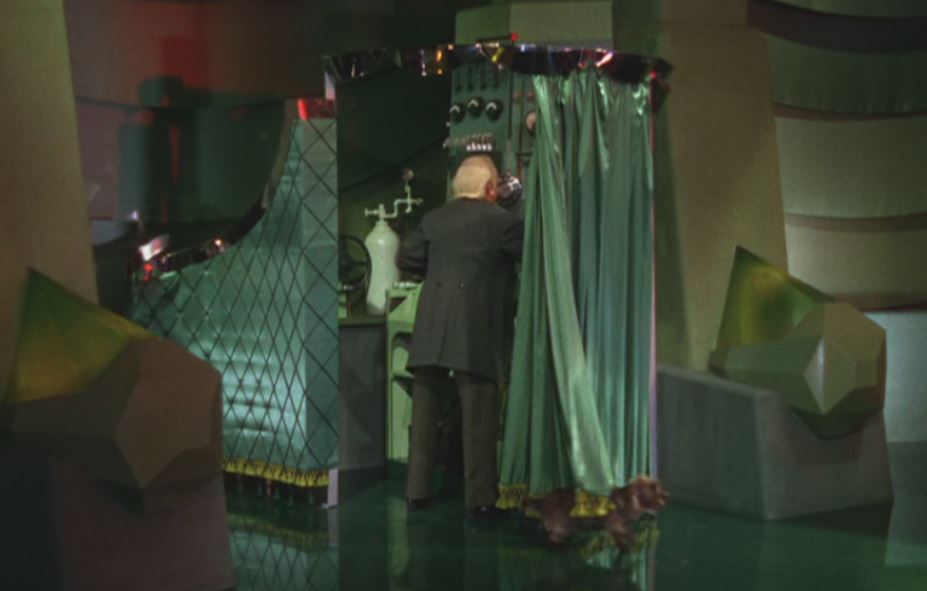

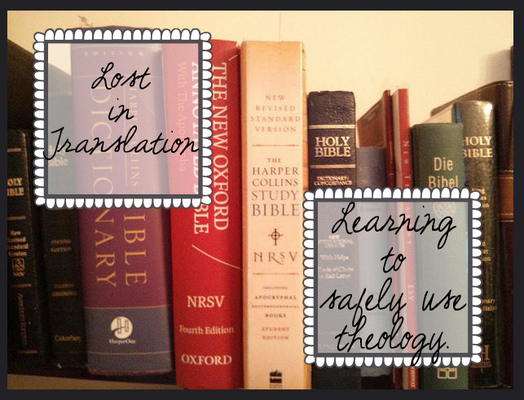
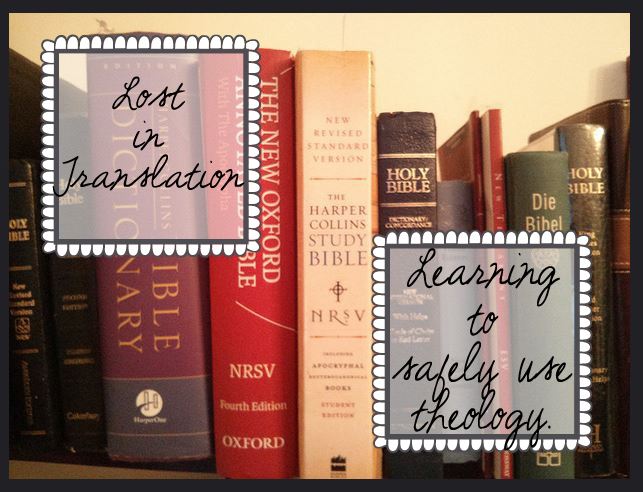
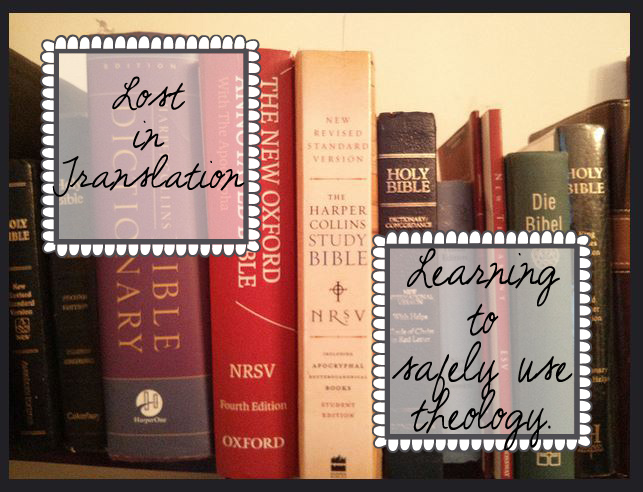
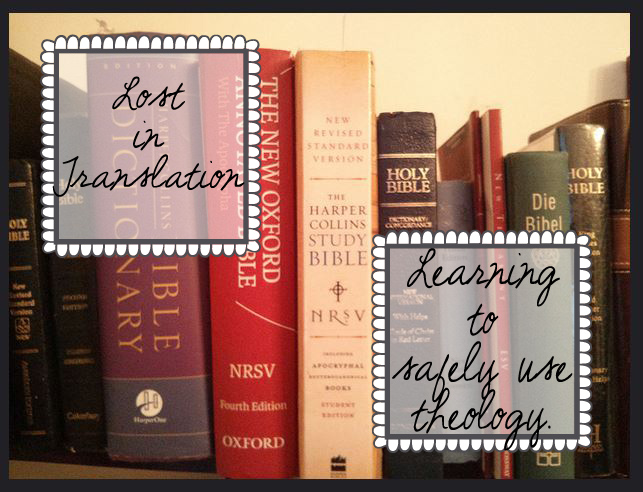
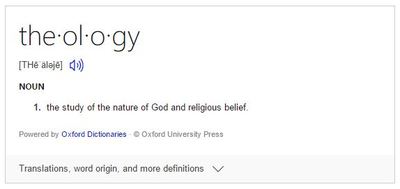
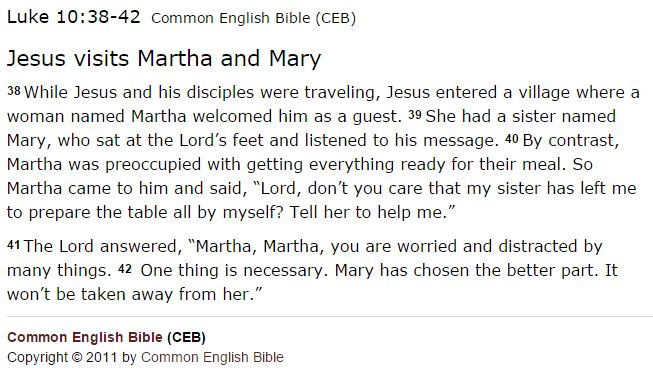
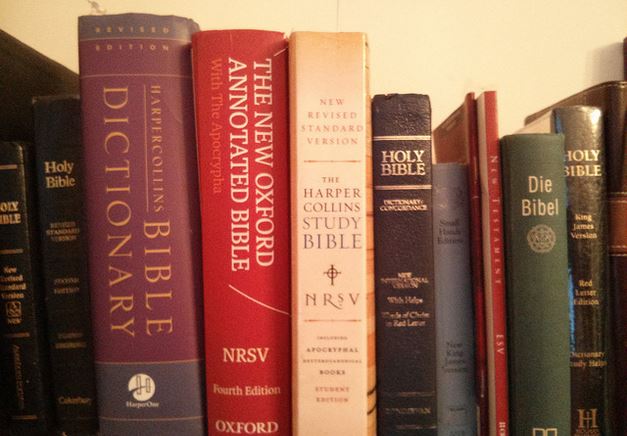

 RSS Feed
RSS Feed